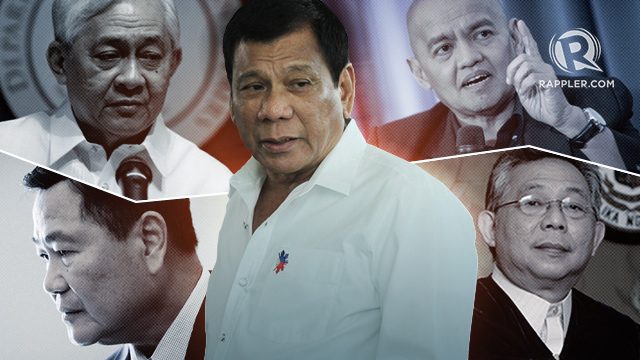SUMMARY
This is AI generated summarization, which may have errors. For context, always refer to the full article.

MANILA, Philippines – As the Duterte administration insists on an existing state of rebellion in Mindanao, it turns out that the government failed to charge a single individual with rebellion throughout 2018 – or during the 2nd extension of martial law in the region.
The government claimed it arrested 5 people in Mindanao in 2018 in relation to martial law.
One person was charged with illegal possession of explosives on January 24. Two other people who were arrested during the same period have been released due to insufficiency of evidence. The 5th person is undergoing preliminary investigation, but for illegal possession of firearms and illegal possession of explosives.
The data came from the government itself, which the Philippine National Police (PNP) confirmed to the Supreme Court as shown in the full text of the decision and opinions recently made public.
“The fact that the government has not charged any person of rebellion during the second extension militates against the presumption that these acts, on their own, constitute substantial evidence of a persisting rebellion in Mindanao,” said Associate Justice Benjamin Caguioa, whose original ponencia turned into a dissenting opinion when he lost to the majority, 9-4.
Nine justices voted to uphold the constitutionality of the 3rd extension of martial law in Mindanao which would last until yearend of 2019.
Caguioa showed in his dissenting opinion the government’s inconsistent and insufficient reports of violence and attacks to support its assertion that a state of rebellion exists in Mindanao.
Reports of violence were either attributed to two terror groups, while some could not be pinned on anyone. In other cases, the government could not cite motives for the attacks.
Caguioa said that after oral arguments, the Court gave the government time to make further submissions to bolster their case that an extension was needed.
“Unfortunately, nothing in the Memorandum of the respondents was submitted to complete the incomplete entries. Neither did the respondents attempt to even explain how a fair amount of these incidents were attributed, or could be attributable, to what the respondents called ‘rebels’ – despite the fact that the reports do not identify the perpetrators or the motive, or supply the identity of the perpetrators, all of which point to the conclusion that these are common ceimes committed for private purposes,” said Caguioa.
Senior Associate Justice Antonio Carpio was straightforward in his short dissent, saying that the Duterte administration failed to prove a state of ongoing rebellion.
“In fact, the Government has not named any province, city or municipality in the entire Mindanao where an actual rebellion by the Maute group is on-going,” Carpio said.
President’s judgment outweighs all
Defending the majority decision, Chief Justice Lucas Bersamin once told media that violence reports need not be accurate to validate martial law.
President Rodrigo Duterte just needs to believe them, Bersamin said.
That reasoning is now enshrined in jurisprudence.
“We must not fall into or be tempted to substitute our own judgment to that of the People’s President and the People’s representatives. We must not forget that the Constitution has given us separate and quite distinct roles to fill up in our respective branches of government,” said the 34-page ponencia written by newly-appointed justice Rosmari Carandang.
Caguioa called this “an unbecoming deference to the political departments so inconsistent with the provisions of the present Constitution.”
Caguioa said that what the court has done was to allow a “wholesale branding” of common criminals and terrorists as rebels.
Dissenter Justice Francis Jardeleza, who was once with the majority during the first martial law petition in 2017, said that the recent decision shows “the Court’s deeming abdication of its duty.”
“I submit this Opinion to reiterate my grave concerns over the Court’s seeming abdication of its duty under Section 18, Article VII of the Constitution as a consequence of its adamant refusal to ‘substitute its own judgment’ over that of the President or Congress,” said Jardeleza.
In his usual strong tone, another dissenter, Associate Justice Marvic Leonen, wrote: “With this fourth accommodation, we have become an enfeebled Supreme Court, far from what our fundamental law requires of us when the President exercises his commander-in-chief powers. What the majority has done disappoints a better reading of history. It all but removes the constitutional protections against the rise of another authoritarian.” – Rappler.com
Add a comment
How does this make you feel?
There are no comments yet. Add your comment to start the conversation.